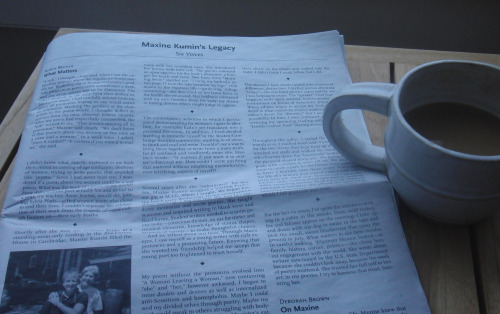Remembering Maxine Kumin
Maxine Kumin’s life and poems keep inspiring a year after her death, her ashes scattered in the outermost pasture between the vegetable garden and the woods of her southern New Hampshire farm. The January/February issue of American Poetry Review includes “Maxine Kumin’s Legacy: Six Voices,” deeply moving tributes from poets who adored her, some first as students, and later friends who’d visit and talk about poems by the pond, ride horses, or cross country ski. All six poets are women, and several spoke of her importance to them in showing what a woman poet could be: deeply engaged with politics, physically strong, happily married, a good mother, a nurturer of animals, a generous and intelligent teacher, and committed to her writing. Her example was a welcome relief from more publicized images of women poets as solitary, suicidal, or narcissistic. Emily Grosholz writes of how Maxine “just wanted to write poems and ride horses and raise children and run a farm and respond to her friends and tell the truth about the world as she understood it and generally get on with her life.”
Robin Becker remembers how Maxie showed up in her graduate class at Boston University in 1973 as a substitute for Anne Sexton. Robin was a closeted lesbian at the time and had turned in a poem with pronouns carefully deleted. She writes that after her peers respectfully commented, Maxine noted, “We don’t know if this poem’s about two women or two men or a man and a man and a woman.” Robin asked, “Does it matter?” “It matters if you want it to matter,” she replied.
At that time Robin was trying to figure out what mattered, and as she did (“what matters to me resides in careful looking”), the two became friends, over the decades exchanging poems, with Maxine offering “hardnosed but encouraging, critical commentary” and talking about their work as teachers.
Deborah Brown writes of Maxine’s resistance to abstractions, and Darla Himeles quotes, “A poem is built on the furniture that’s in it,” referring to “the nouns and verbs that form a poem’s internal structure – key words that should be sturdy, aesthetically appropriate, and specific enough to be poetically functional.” She also quotes her from a workshop at the Provincetown Fine Arts Work Center as saying, “A poem is a small thing. It’s fragile, and you don’t want to overcrowd it.”
Carole Simmons Oles remembers making lentil soup she brought to Maxine’s house after her good friend Anne Sexton died, then forty years later, simmering it in her kitchen after receiving “the news from Maxine’s daughter Judith that her mother was slipping away.” Carole wrote about their early friendship and the later years when Maxine struggled with pain and health, sustained by writing. These pages are filled with grateful lives touched and changed – so grab this issue of APR while you can. The tribute ends with Alicia Ostriker’s poem, “The Redeemed World,” that cites strawberries, horses, the pond, the Red Sox, and Maxine’s love and courage.





